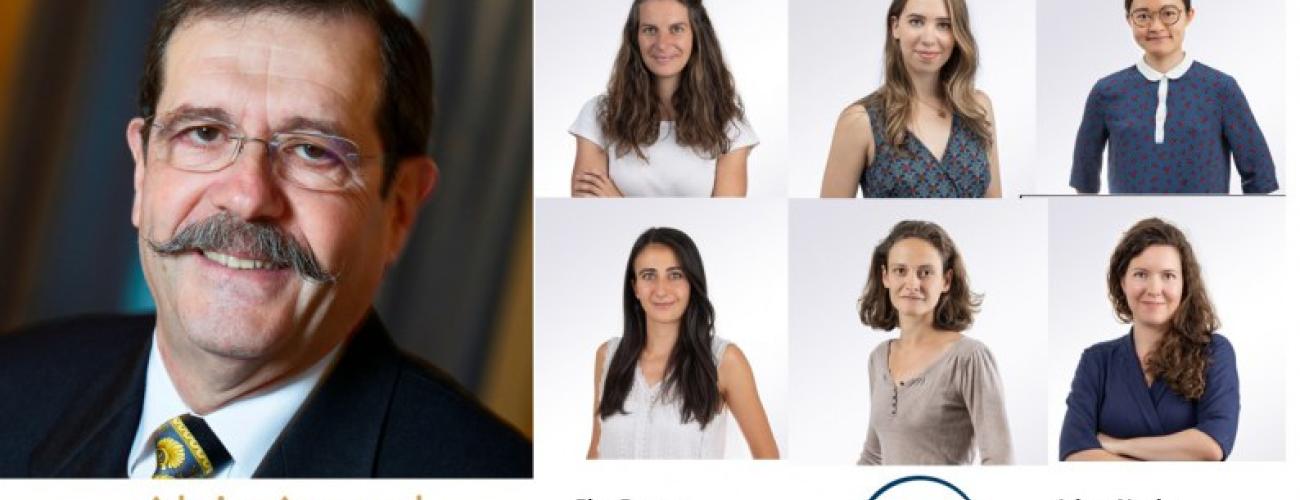
ParisTech schools' research highlighted in October
Research and education by research at ParisTech schools were honored in October. The work of Alain Aspect, an exceptional researcher and professor at the Institut d'Optique Graduate School, was recognized by the award of the Nobel Prize in Physics 2022. Then it was the turn of the Foundation L'Oréal For Women in Science to recognize the talent of young women scientists by awarding them the L'Oréal-UNESCO Young Talents France Prize 2022.
France stands out again in physics thanks to Alain Aspect, who was awarded the 2022 Nobel Prize in Physics by the Nobel Academy, shared with John F. Clauser (United States) and Anton Zeilinger (Austria). ParisTech congratulates Alain Aspect, a researcher at the Laboratory Charles Fabry of the Institut d'Optique Graduate School (Université Paris-Saclay) and the CNRS, which hosts his research. Once again, French physics, and in particular quantum research, has distinguished itself at the global level. This prize crowns an exceptional career.
Alain Aspect joins the list of Nobel Prize winners, members of the academic or scientific staff of from the ParisTech schools, whether in physics with Henri Becquerel and Pierre and Marie Curie (1903), Pierre-Gilles de Gennes (1991), Georges Charpak (1992), in chemistry with Henri Moissan (1906), Marie Curie (1911), Frédéric and Irène Joliot-Curie (1935), or in economics with Maurice Allais (1988) or Jean Tirole (2014).
And the next generation is coming... The Foundation L'Oréal For Women in Science awarded the L'Oréal-UNESCO Young Talents France 2022 Prize the following week to several young women, including graduates or researchers of ParisTech schools. Two engineers from the Institut d’Optique, Elsa Ducrot, post-doctoral fellow in physics, and Elena Gofas Salas, post-doctoral fellow in biomedical engineering, and Mathilde His, an engineer from AgroParisTech and post-doctoral fellow in health sciences, were thus distinguished, Irène Nagle, engineer from ESPCI Paris - PSL, PhD candidate in biological sciences, as well as Anne Nguyen doing her PhD at the Institut d’Optique (Charles Fabry Laboratory) and Noémi Renaudin, post-doctoral fellow at ESPCI (Physics for Medicine Paris).
These numerous awards show that research is part of the DNA of ParisTech's engineering schools. Alain Aspect is a perfect example of the proposed education model, a research-based training. Indeed, while tomorrow's engineers must identify scientific and technological solutions to solve the challenges our societies are facing, they must also know how to explore new avenues and anticipate future developments.
The young women awarded the Young Talent Prize show that it is possible to be an engineer and a researcher, and that engineering education also prepares students for this type of career and professional challenge in an environment of excellence, the laboratories of the schools where some of them are currently conducting their research. They have thus been confronted from the outset of their training, on a daily basis - in classes, in practical exercises or in the frame of projects and internships - with the questions that researchers ask themselves in their laboratories and also experiment the scientific approach.
Indeed, the ParisTech schools host high-level academic staff who make engineering students aware of the scientific issues and challenges by presenting their own work and providing access to their laboratories and research facilities (InnLabs, technological platforms, etc.) along the curriculum. In addition to classes with researchers, they offer students activities to raise awareness of research, and even activities dedicated to research - laboratory internships, research projects, a research master's degree in parallel with the final year, etc.
The ParisTech schools' students thus benefit from a very high level of scientific educatin that they can put to good use, if they so wish, by pursuing a PhD after obtaining their diploma (10 to 70% of the students in a class, depending on the school).

